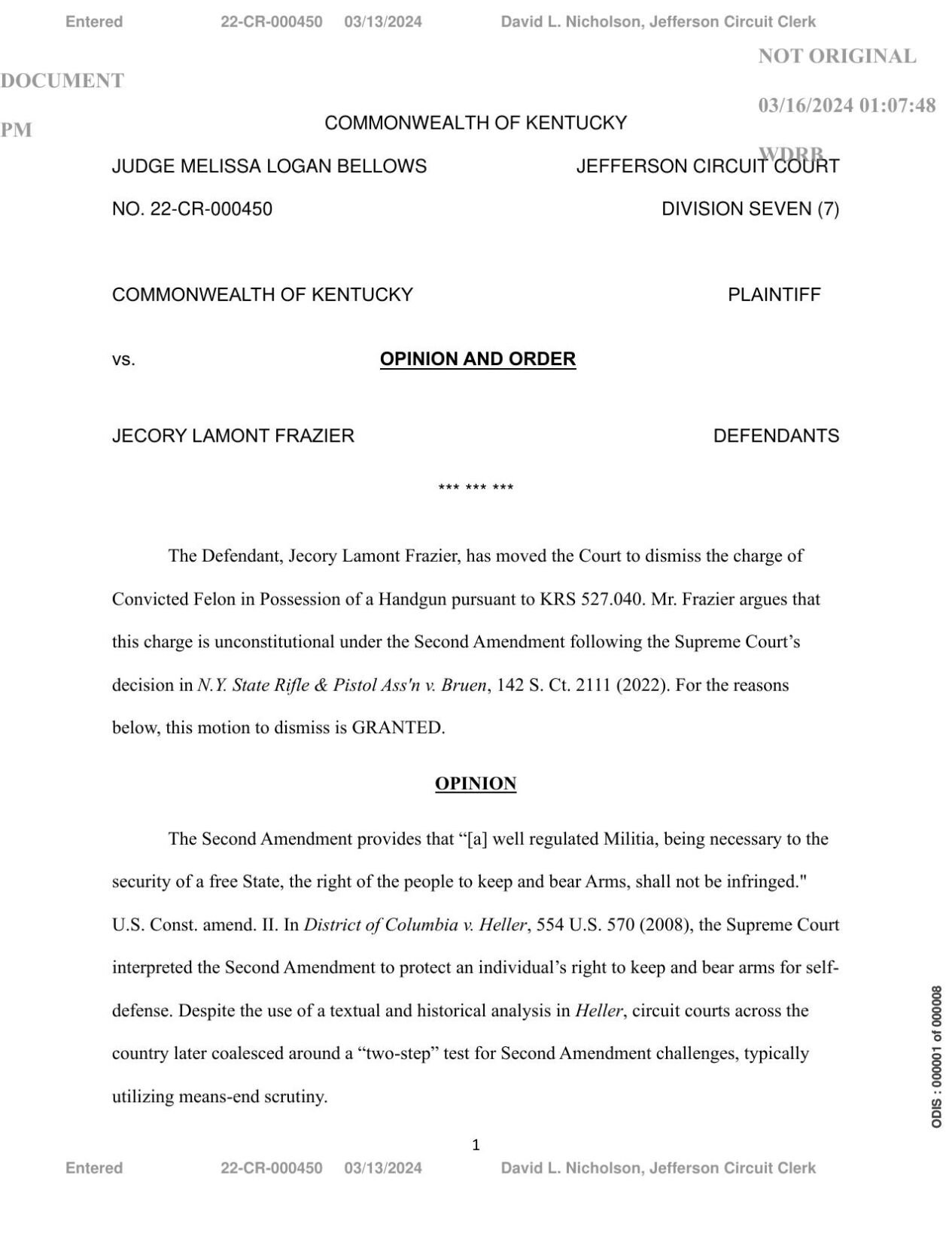LOUISVILLE, Ky. (WDRB) – In what appears to be a first-of-its-kind ruling in Louisville, a judge determined that a convicted felon can't be prosecuted on a firearms charge because it violates his Second Amendment rights.
Jefferson Circuit Court Judge Melissa Logan Bellows ruled Wednesday that it is unconstitutional for prosecutors to move forward with their case against Jecory Lamont Frazier under a state law prohibiting felons from owning a gun because it doesn’t outweigh the Second Amendment right that belongs to “all Americans.”
The Jefferson Commonwealth’s Attorney’s office had argued before Bellows that the U.S. justice system has consistently disarmed people “who it deems to be unvirtuous, such as felons” and that the Kentucky Supreme Court has supported this argument.
But Bellows, who was elected in 2022, cited a 2008 U.S. Supreme Court ruling that there is a “strong presumption that the Second Amendment right is exercised individually and belongs to all Americans.”
“Therefore, the Court is reluctant to accept that the limits on the right protected by the Second Amendment are defined by a person’s virtue or good character,” Bellows ruled.
In a statement on Friday, the Commonwealth's Attorney's office said the ruling "deviates from well-established precedent, norm, and case law. We disagree with the ruling, and we are initiating steps to appeal it. Judges can make their own interpretations regarding the law, but they are subject to appellate scrutiny, which provides checks and balances on the judicial system."
Bellows also ruled the prosecutors did not present evidence of a historical tradition of disarming felons after the Second Amendment was ratified in 1791.
Prosecutors, she said, failed to prove that state law “is consistent with this Nation’s historical tradition of firearm regulation.”
Frazier was arrested on November 6, 2021, after Louisville Metro Police were called to the 3900 block of Taylor Blvd., after a driver hit a pole.
Police claim Frazier attempted to hide something in his vehicle when police arrived and then pulled out a handgun and handed it to a co-defendant “to conceal from officers that he is a felon in possession of a handgun,” according to the arrest citation.
His previous convictions include drug trafficking, fraud, tampering which physical evidence and being a felon in possession of a handgun.
In October, his attorney, Rob Eggert, asked to dismiss the gun charge and cited a 2019 case in front of Judge Amy Coney Barrett, who is now a Supreme Court Justice, where she ruled that “founding-era legislators did not strip felons of the right to bear arms simply because of their status as felons.”
Eggert wrote that other appeals courts across the nation, including in Mississippi, are ruling that laws prohibiting felons from owning firearms are unconstitutional.
And he pointed out that in 2006, Kentucky Supreme Court Justice Will T. Scott wrote in a dissenting opinion that, historically, Kentucky did not prohibit anyone from owning a firearm, including convicted felons.
Assistant Commonwealth’s Attorney Jackson Rice argued in a motion in the case that the U.S. high court rulings cited by Eggert and Bellows did not state that felons should be allowed to own guns.
“While the defendant’s conduct – possessing a firearm – might be covered by the plain text of the Second Amendment, the historical tradition of firearm regulation plainly supports a ban on convicted felons being in possession of a firearm,” he wrote in a motion.
As far as the historical argument, Rice wrote that in colonial times, convicted felons could not own “property or chattels and, thereby, implicitly, could not possess a firearm.”
The statement from the Commonwealth's Attorney's office noted the the Kentucky Supreme Court has ruled that felon in possession of a firearm prohibitions did not violate the state constitution.
Brian Butler, who used to be a prosecutor and is now a defense attorney, said he believes the ruling "is an earth shattering opinion" that will prompt similar motions in other gun cases until the state Supreme Court rules on the issue.
More area crime stories:
- Man dies after being stabbed to death in Fairdale early Friday morning
- Coroner identifies 3 killed, including unborn child, after shooting in Louisville's Park Hill neighborhood
- Brice Rhodes sentenced to life in prison for 2016 triple murder conviction
- The 3 men charged in the Crystal Rogers murder should stand trial together, prosecutor argues
- New search warrant accuses Jamey Noel of using fire department funds for high-end clothing
Copyright 2024 WDRB Media. All Rights Reserved.














